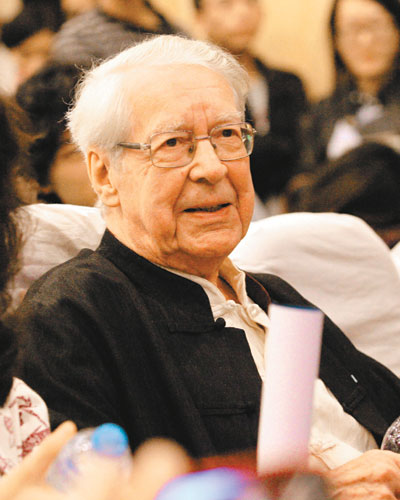|

A SWEDISH Academy member has defended Nobel Prize in Literature winner Mo Yan, saying the Chinese novelist’s win “had nothing to do with politics, friendship or luck.”
Goran Malmqvist, a sinologist and one of 18 members of the Swedish Academy, the body responsible for selecting the winner of the Nobel Prize in Literature, said Sunday that he felt irritated at media accusations lodged against Mo.
Some journalists questioned his win after Mo’s win was announced Oct. 11, stating that his membership of the Communist Party of China (CPC) and position as vice president of the China Writers Association should have disqualified him.
Malmqvist, who was on a three-day visit to Shanghai, described the accusations as “quite unfair to Mo.”
“The media workers who criticized Mo could not have even read one of his books,” Malmqvist said at a press conference.
“They know nothing about the quality of Mo’s literature. They should not have opened fire on him,” Malmqvist said, adding that the only standard used to decide the winner is the quality of his or her literature.
Malmqvist said Swedish Academy members decided on this year’s Nobel laureate without many of the heated debates that usually take place during the voting process.
“We reached a consensus and selected Mo from the five finalists in a comparatively peaceful manner,” he said.
Malmqvist was invited to China by a Shanghai-based publishing house to promote a new book by Swedish poet Tomas Transtromer that Malmqvist translated into Chinese.
Malmqvist said China’s literature should have been introduced to the world a long time ago.
“There are many world-class or even greater than world-class writers in China,” Malmqvist said.
Malmqvist said Mo’s win will encourage Chinese people to attach more importance to translation, which “will help Chinese literature get closer to world literature.”
He also denied recent media allegations that he will benefit financially from the publication of his translations of Mo’s works, pledging that he will not “take a penny” from any Swedish publishing house.
“As a member of the Swedish Academy, I was commissioned to do the translations,” he said. “My translations of Mo’s works will be provided to publishing houses for free.”
Earlier media reports accused Malmqvist of selling his translations of Mo’s works to a Swedish publisher amid intense interest in the writer.
His translations include some of Mo’s novellas and short stories.
The Swedish Academy member also revealed to the press that some Chinese writers constantly tried to win his favor and an official had even attempted to bribe him, according to Chongqing Economic Times and other Chinese media.
Malmqvist said every month Chinese writers send him their manuscripts hoping he will translate them. The Chongqing paper reported that Malmqvist said some writers even asked him to nominate them for a Nobel Prize in Literature. One unnamed writer, who is also a government official from Shandong Province, tried to influence Malmqvist with gifts.
“The cultural official mailed me many paintings and ancient books, pleading with me to help him win the prize,” Malmqvist said, adding that the official told him he could keep the US$1.2-million award.
“I returned everything, but later found out that he began writing to another member of the academy,” said Malmqvist.
Zhang Jiong, honorary vice president of the Chinese Writers Association, said he met Malmqvist three times and the issue never came up, adding that it’s not likely any writer could influence the committee as recipients are all well-established writers with a large and impressive body of work.
Malmqvist said real writers are afraid to meet him as it would be seen as inappropriate. (SD-Agencies)
|

